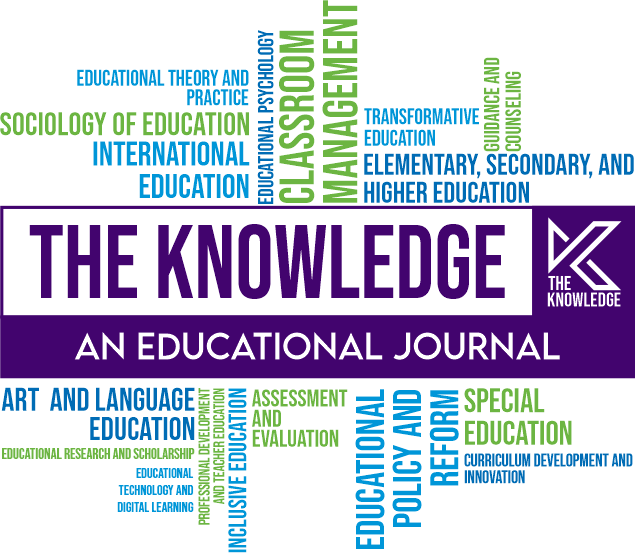Effects of the Jigsaw Model on Students Academic Achievement at Primary School Level
DOI:
https://doi.org/10.63062/tk/2k22a.14508Keywords:
Jigsaw Model, Recall, Comprehension, Primary School Level, StudentsAbstract
The study was conducted to determine the effect of the Jigsaw model on students remembering and understanding ability. A quantitative research approach was adopted in this study. The research design of the study was experimental. All the students at Government Primary School Loralai Cantt constituted the population of the study. To ensure adequate representation of the population, eight students of class 5th were selected as a sample of the study. A science achievement test consisting of 30 items was developed. Fifteen items were associated with knowledge level, and 15 were associated with comprehension level. Students were pre- and post-tested in science achievement tests. The results of the pretest and post-test were analyzed with the help of SPSS using an independent sample t-test. The findings from the pretest, posttest, and student accomplishment score on the scientific achievement test showed that, following instruction using the Jigsaw Model, every student's posttest score increased. The gain score demonstrated the Jigsaw model's impact on students' academic achievement on the scientific achievement test. The knowledge level pretest and posttest results showed that, following Jigsaw Model instruction, every student's posttest score increased. The gain score demonstrated the Jigsaw model's impact on students' academic achievement on the scientific achievement test. The comprehension level pretest and posttest results showed that following Jigsaw Model instruction, every student's posttest score increased. The gain score demonstrated the Jigsaw model's impact on students' academic achievement on the scientific achievement test.
References
Bigge, J. L., & Stump, C. S. (1999). Curriculum, Assessment, and Instruction for Students with Disabilities. The Wadsworth Special Educator Series. Wadsworth Publishing
Blaney, N. T., Stephan, C., Rosenfield, D., Aronson, E., & Sikes, J. (1977). Interdependence in the classroom: A field study. Journal of Educational Psychology, 69(2), 121-128. https://doi.org/10.1037/0022-0663.69.2.121
Caldwell, M. B., Weishar, J., & William, G. (1996). The effect of cooperative learning on student perceptions of accounting in the principles courses. Journal of Accounting Education, 14(1), 17-36. https://doi.org/10.1016/0748-5751(95)00032-1
Dyson, B., & Casey, A. (Eds.). (2012). Cooperative learning in physical education. New York, NY: Taylor & Francis.
Göçer, A. (2010). Türkçe öğretiminde yazma eğitimi. Uluslararası Sosyal Araştırmalar Dergisi-Journal of International Social Research, 3(12), 1-20.
Jovanov, K. (2021, April). Jigsaw Classroom and Law Teaching–Theoretical and Practical Implications from Modeled Lecture with ‘Jigsaw Classroom. In Innovative Teaching in European Legal Education (pp. 87-96). Nomos Verlagsgesellschaft mbH & Co. KG.
Law, Y. K. (2011). The effects of cooperative learning on enhancing Hong Kong fifth graders' achievement goals, autonomous motivation, and reading proficiency. Journal of research in reading, 34(4), 402-425. https://doi.org/10.1111/j.1467-9817.2010.01445.x
Mengduo, Q., & Xiaoling, J. (2010). Jigsaw Strategy as a Cooperative Learning Technique: Focusing on the Language Learners. Chinese Journal of Applied Linguistics (Foreign Language Teaching & Research Press), 33(4), 113-125. https://web.archive.org/web/20180415151410id_/http://www.celea.org.cn/teic/92/10120608.pdf
Oludipe, D., & Awokoy, J. O. (2010). Effect of cooperative learning teaching strategy on the reduction of students’ anxiety for learning chemistry. Journal of Turkish Science Education, 7(1), 30-36.
Perkins, D. V., & Tagler, M. J. (2011). Jigsaw classroom. Promoting student engagement, 1, 195-197.
Souvignier, E., & Kronenberger, J. (2007). Cooperative learning in third graders' jigsaw groups for mathematics and science with and without questioning training. British Journal of Educational Psychology, 77(4), 755-771. https://doi.org/10.1348/000709906x173297
Zacharia, Z. C., Xenofontos, N. A., & Manoli, C. C. (2011). The effect of two different cooperative approaches on students’ learning and practices within the context of a WebQuest science investigation. Educational Technology Research and Development, 59(3), 399-424. https://doi.org/10.1007/s11423-010-9181-2
Published
Issue
Section
License
Copyright (c) 2025 Copyright in the THE KNOWLEDGE is retained by the author(s). Authors also grant any third party the right to use the article freely as long as its integrity is maintained and its original authors, citation details and publisher are identified.
This work is licensed under a Creative Commons Attribution-NonCommercial 4.0 International License.







